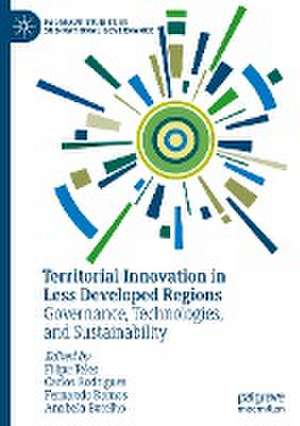Territorial Innovation in Less Developed Regions: Governance, Technologies, and Sustainability: Palgrave Studies in Sub-National Governance
Editat de Filipe Teles, Carlos Rodrigues, Fernando Ramos, Anabela Botelhoen Limba Engleză Hardback – 12 mar 2023
| Toate formatele și edițiile | Preț | Express |
|---|---|---|
| Paperback (1) | 740.86 lei 38-44 zile | |
| Springer International Publishing – 13 mar 2024 | 740.86 lei 38-44 zile | |
| Hardback (1) | 785.55 lei 6-8 săpt. | |
| Springer International Publishing – 12 mar 2023 | 785.55 lei 6-8 săpt. |
Preț: 785.55 lei
Preț vechi: 957.99 lei
-18% Nou
Puncte Express: 1178
Preț estimativ în valută:
150.31€ • 156.95$ • 124.12£
150.31€ • 156.95$ • 124.12£
Carte tipărită la comandă
Livrare economică 15-29 aprilie
Preluare comenzi: 021 569.72.76
Specificații
ISBN-13: 9783031205767
ISBN-10: 3031205766
Pagini: 305
Ilustrații: XXIII, 305 p. 43 illus., 34 illus. in color.
Dimensiuni: 148 x 210 mm
Greutate: 0.54 kg
Ediția:2023
Editura: Springer International Publishing
Colecția Palgrave Macmillan
Seria Palgrave Studies in Sub-National Governance
Locul publicării:Cham, Switzerland
ISBN-10: 3031205766
Pagini: 305
Ilustrații: XXIII, 305 p. 43 illus., 34 illus. in color.
Dimensiuni: 148 x 210 mm
Greutate: 0.54 kg
Ediția:2023
Editura: Springer International Publishing
Colecția Palgrave Macmillan
Seria Palgrave Studies in Sub-National Governance
Locul publicării:Cham, Switzerland
Cuprins
1. Community-led innovation: facts, rhetoric, and policy challenges.- Part 1: Models.- 2. New Models of Innovation in Old Industrial Regions.- 3. On the Performance of Regional Innovation Systems.- 4. Social Tipping Dynamics for disruptive innovation policies towards a stable climate scenario.- 5. Digital technologies and mediation in the context of territorial innovation.- 6. Towards an integrated conceptual framework of Territorial Innovation in Less Developed Regions: the Sustainable Regions’ approach.- Part 2: Tools.- 7. Digitalisation in a multilevel governance context: the case of Cohesion Policy.- 8. Prototyping a digital platform to promote mediation practices in the territory.- 9. The role of strategic environmental assessment for sustainability in urban systems transformation.- Part 3: Policy and actors.- 10. The role of state and non-state actors in ensuring the effectiveness of innovation policy.- 11. European Urban Agenda: The Predicaments ofDecentralised Coordinative Action.- 12. Local Development through entrepreneurship and innovation ecosystems.- 13. Tourism and development in lagging regions.- 14. Territorial Cohesion and Innovation: a needed dialogue.
Notă biografică
Filipe Teles is Pro-Rector for Regional Development and Urban Policies at the University of Aveiro, Portugal.
Fernando Ramos is Professor of Communication Sciences and Technologies at the University of Aveiro, Portugal.
Carlos Rodrigues is Associate Professor and Head of the Department of Social, Political and Territorial Sciences at the University of Aveiro, Portugal.
Anabela Botelho is Professor of Economics at the University of Aveiro, Portugal.
Fernando Ramos is Professor of Communication Sciences and Technologies at the University of Aveiro, Portugal.
Carlos Rodrigues is Associate Professor and Head of the Department of Social, Political and Territorial Sciences at the University of Aveiro, Portugal.
Anabela Botelho is Professor of Economics at the University of Aveiro, Portugal.
Textul de pe ultima copertă
This book examines the roles of communities in the general framework of territorial innovation, particularly in the context of less developed regions. With a specific focus on Portugal, it offers conceptual improvements that will be of use to other European regions. The book will appeal to scholars and students of regional governance and politics, from public administration to economics, sociology, geography and political science, as well as to practitioners.
Filipe Teles is Pro-Rector for Regional Development and Urban Policies at the University of Aveiro.
Fernando Ramos is Professor of Communication Sciences and Technologies at the University of Aveiro.
Carlos Rodrigues is Associate Professor and Head of the Department of Social, Political and Territorial Sciences at the University of Aveiro. Anabela Botelho is Professor of Economics at the University of Aveiro.
Fernando Ramos is Professor of Communication Sciences and Technologies at the University of Aveiro.
Carlos Rodrigues is Associate Professor and Head of the Department of Social, Political and Territorial Sciences at the University of Aveiro. Anabela Botelho is Professor of Economics at the University of Aveiro.
Caracteristici
Provides new insights on the processes of fostering territorial innovation in less-developed regions in Europe Focuses on policy implementation strategies needed to maintain community-led innovation Challenges conventional studies with a strong interdisciplinary approach











